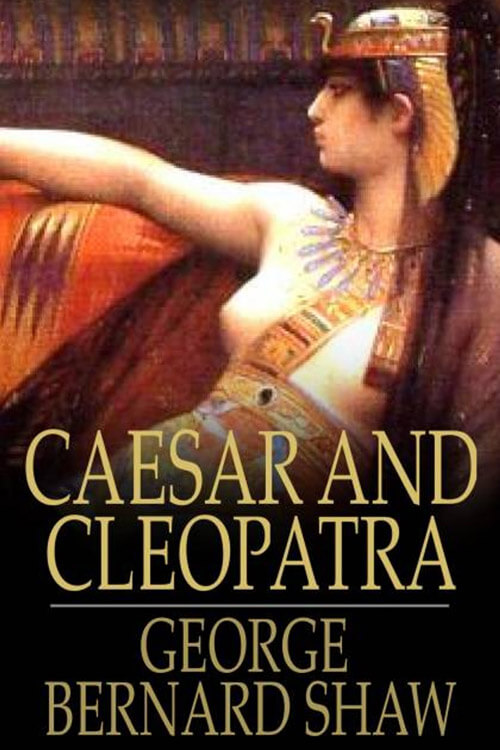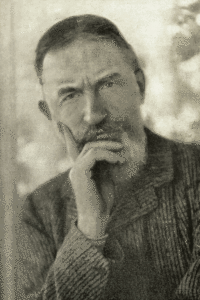
Caesar and Cleopatra
An October night on the Syrian border of Egypt towards the end of the XXXIII Dynasty, in the year 706 by Roman computation, afterwards reckoned by Christian computation as 48 B.C. A great radiance of silver fire, the dawn of a moonlit night, is rising in the east. The stars and the cloudless sky are our contemporaries, nineteen and a half centuries younger than we know them; but you would not guess that from their appearance. Below them are two notable drawbacks of civilization: a palace, and soldiers. The palace, an old, low, Syrian building of whitened mud, is not so ugly as Buckingham Palace; and the officers in the courtyard are more highly civilized than modern English officers: for example, they do not dig up the corpses of their dead enemies and mutilate them, as we dug up Cromwell and the Mahdi. They are in two groups: one intent on the gambling of their captain Belzanor, a warrior of fifty, who, with his spear on the ground beside his knee, is stooping to throw dice with a sly-looking young Persian recruit; the other gathered about a guardsman who has just finished telling a naughty story (still current in English barracks) at which they are laughing uproariously. They are about a dozen in number, all highly aristocratic young Egyptian guardsmen, handsomely equipped with weapons and armor, very un-English in point of not being ashamed of and uncomfortable in their professional dress; on the contrary, rather ostentatiously and arrogantly warlike, as valuing themselves on their military caste.
Belzanor is a typical veteran, tough and wilful; prompt, capable, and crafty where brute force will serve; helpless and boyish when it will not: an effective sergeant, an incompetent general, a deplorable dictator. Would, if influentially connected, be employed in the two last capacities by a modern European State on the strength of his success in the first. Is rather to be pitied just now because Julius Caesar is invading his country. Not knowing this, is intent on his game with the Persian, whom, as a foreigner, he considers quite capable of cheating him.
His subalterns are mostly handsome young fellows whose interest in the game and the story symbolizes with tolerable completeness the main interests in life of which they are conscious. Their spears are leaning against the walls, or lying on the ground ready to their hands. The corner of the courtyard forms a triangle of which one side is the front of the palace, with a doorway, the other a wall with a gateway. The storytellers are on the palace side: and the gamblers, are on the gateway side. Close to the gateway, against the wall, is a stone block high enough to enable a Nubian sentinel, standing on it, to look over the wall. The yard is lighted by a torch stuck in the wall. As the laughter from the group around the storyteller dies away, the kneeling Persian, winning the throw, snatches up the stake from the ground.
BELZANOR. By Apis, Persian, thy gods are good to thee.
THE PERSIAN. Try yet again, O captain. Double or quit!
BELZANOR. No more. I am not in the vein.
THE SENTINEL (poising his javelin as he peers over the wall). Stand. Who goes there?
They all start, listening. A strange voice replies from without.
Read or download Book
George Bernard Shaw
George Bernard Shaw (26 July 1856 – 2 November 1950), known at his insistence as Bernard Shaw, was an Irish playwright, critic, polemicist and political activist.
Biography.
His influence on Western theatre, culture, and politics extended from the 1880s to his death and beyond. He wrote more than sixty plays, including major works such as Man and Superman (1902), Pygmalion (1913) and Saint Joan (1923). With a range incorporating both contemporary satire and historical allegory, Shaw became the leading dramatist of his generation, and in 1925 was awarded the Nobel Prize in Literature.
Born in Dublin, Shaw moved to London in 1876, where he struggled to establish himself as a writer and novelist, and embarked on a rigorous process of self-education. By the mid-1880s he had become a respected theatre and music critic. Following a political awakening, he joined the gradualist Fabian Society and became its most prominent pamphlete. Shaw had been writing plays for years before his first public success, Arms and the Man in 1894. Influenced by Henrik Ibsen, he sought to introduce a new realism into English-language drama, using his plays as vehicles to disseminate his political, social, and religious ideas. By the early twentieth century, his reputation as a dramatist was secured with a series of critical and popular successes that included Major Barbara, The Doctor’s Dilemma, and Caesar and Cleopatra.
Shaw’s expressed views were often contentious; he promoted eugenics and alphabet reform and opposed vaccination and organized religion. He courted unpopularity by denouncing both sides in the First World War as equally culpable, and although not a republican, castigated British policy on Ireland in the postwar period. These stances had no lasting effect on his standing or productivity as a dramatist; the inter-war years saw a series of often ambitious plays, which achieved varying degrees of popular success. In 1938 he provided the screenplay for a filmed version of Pygmalion for which he received an Academy Award. His appetite for politics and controversy remained undiminished; by the late 1920s, he had largely renounced Fabian Society gradualism, and often wrote and spoke favorably of dictatorships of the right and left—he expressed admiration for both Mussolini and Stalin. In the final decade of his life, he made fewer public statements but continued to write prolifically until shortly before his death, aged ninety-four, having refused all-state honors, including the Order of Merit in 1946.
Since Shaw’s death scholarly and critical opinion about his works has varied, but he has regularly been rated among British dramatists as second only to Shakespeare; analysts recognize his extensive influence on generations of English-language playwrights. The word Shavian has entered the language as encapsulating Shaw’s ideas and his means of expressing them.






